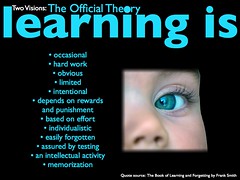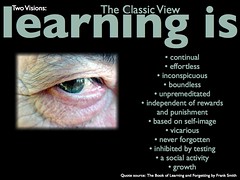What makes for a good leader?
Most folks think that “followers” would be the required component. But anyone who has led anything more than a rousing chorus of “Row Row Row Your Boat” understands that the measure of leadership is the number of leaders you produce, not the number of followers you attract.
Leaders don’t just magically appear. Yet, many congregations still expect their leaders to arrive. Rare are the congregations who expect leaders to grow out of the organic processes of discipleship. Instead, we search. We advertise. We recruit.
I have found a couple of major obstacles to developing leaders in the local church. Let’s take a look at both of them in turn while examining some of the solutions that can help us overcome them.
“But, I’m Not Qualified to Lead”
This one is perhaps the easiest obstacle of the ones we’ll be considering. Responses like this come out of the “attraction” model that the world has developed. Headhunters and search committees seek out and recruit the best of the best across the country and around the world. But as the leadership pool grows shallow, many organizations are left with the also-ran.
Successful companies and successful churches are utilizing leadership development programs. While the corporate models for leadership use a specific set of criteria, I tend to focus on identifying people with an affinity for imagination and enthusiasm. Creative solutions are tough to teach. But the basic skills of imagination and enthusiasm are not often hard to find.
Once those qualities are located, I focus on teaching the basic principles of problem solving. I teach people how to see patterns. I use examples of success in similar churches. I help people to see why a plan succeeds and why another fails.
In this way, the average dreamer can become a leader by applying the fire of creativity to the knowledge of the systems that are in place.
“But, I’m Short on Skills”
This reply is similar to the first one, but a bit more specific. “I can barely balance my checkbook!” they might say. “Me, too,” is my response.
There are some things I just don’t do well. But I married a very smart woman who has skills and abilities that compliment mine. Now, don’t get any ideas that this is a Mark Driscoll kind of complimentarianism. We share the decisions. We don’t allow stereotypes to determine our roles.
The same ideas hold true in leadership. The basic component isn’t “The Leader.” The basic component is “The Team.” That means that the Leader doesn’t have to know all the answers or possess every skill needed on the team.
When assembling a group of leaders, most important thing is to balance the natural skills and affinities of the people who are taking responsibility. In the absence of a skillset, the natural response is to hire someone or to recruit someone to fill in the blank. But, wait.
Why not send a willing team member for the necessary training? Why not provide it in-house?
“I’m not familiar with the rules of the denomination,” is a frequent response. I have good news: I am fully checked out on that training piece.
In fact, I’ve provided leadership on that and several other topics in dozens of seminars and training sessions. I’m checked out on a plethora of technologies. I know “a little about a lot and a lot about a little.” What I am lacking is time. To become truly expert in an area, the going theory is that one must spend 10,000 hours on it. Obviously, one pastor just can’t do it all.
Now, I am not asking everyone to spend 10,000 hours becoming a committee chair. But most people in my congregation have spent that long becoming disciples of Jesus Christ. If I invest four hours of specialized training in a few key leaders, I can multiply the knowledge that I have and conquer that time crunch. If I keep all the knowledge to myself, I may provide job security for me, but I’m more likely to leave things undone — and leave the church in a tough spot should the Bishop ever decide to move me.
Leading Leaders
The strength of the home-grown leader is credibility and innate authority. These are the people who have the ability to share insights for the future while maintaining a healthy respect for the past.
Even more importantly, the organic leaders of the local church continue to lead long after the pastor has come and gone. This allows for healthy leadership during weak pastorates. Clergy, we’ve all been that guy or that gal at some point — the one who just didn’t click.
And home-grown leadership provides continuity for a leadership system to endure and a framework for a new pastor to enter immediately. This may not sound important, but I’ve often been told the unintentional lie, “Well, you can do whatever you want. The last pastor didn’t really have a system.” I actually believed it — until I followed a colleague who I knew to be systematic and organized.
With that in mind, I discovered that the leaders had simply not been participating, preferring the pastor to take the lead and to make the decisions. Why wouldn’t they join in?
Because they weren’t ready to invest their time and effort in a change they couldn’t embrace.
Leaders need to be able to see the return on investment. They need to see the rewards, no matter how tenuous. Corporations get to use the stick and the carrot. Here in the church, we’ve got the best carrots, but there’s not a stick — at least none that will serve effectively.
What are you doing to develop your leaders beyond simple management training?
Related articles





















The measure of leadership is the number of leaders you produce, not the number of followers you attract. Excellent article.